
A kibbutz is an intentional community in Israel that was traditionally based on agriculture. The first kibbutz, established in 1909, was Degania. Today, farming has been partly supplanted by other economic branches, including industrial plants and high-tech enterprises. Kibbutzim began as utopian communities, a combination of socialism and Zionism. In recent decades, some kibbutzim have been privatized and changes have been made in the communal lifestyle. A member of a kibbutz is called a kibbutznik.

Gush Etzion is a cluster of Israeli settlements located in the Judaean Mountains, directly south of Jerusalem and Bethlehem in the West Bank. The core group includes four Jewish agricultural villages that were founded in 1943–1947, and destroyed by the Arab Legion before the outbreak of the 1948 Arab–Israeli War, in the Kfar Etzion massacre. The area was left outside of Israel with the 1949 armistice lines. These settlements were rebuilt after the 1967 Six-Day War, along with new communities that have expanded the area of the Etzion Bloc. As of 2011, Gush Etzion consisted of 22 settlements with a population of 70,000.

Eliezer Ben‑Yehuda was a Russian–Jewish linguist, grammarian, and journalist, renowned as the lexicographer of the first Hebrew dictionary, and the editor of HaZvi, one of the first Hebrew newspapers published in the Land of Israel/Palestine. He was the main driving force behind the revival of the Hebrew language.
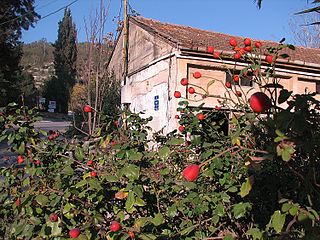
Kiryat Anavim is a kibbutz in the Judean Hills of Israel. It was the first kibbutz established in the Judean Hills. It is located west of Jerusalem, and falls under the jurisdiction of the Mateh Yehuda Regional Council. In 2019 it had a population of 467.

Afikim is an Israeli kibbutz affiliated with the Kibbutz Movement located in the Jordan Valley three kilometers from the Sea of Galilee. It is within the jurisdiction of the Emek HaYarden Regional Council. In 2019 it had a population of 1,511.
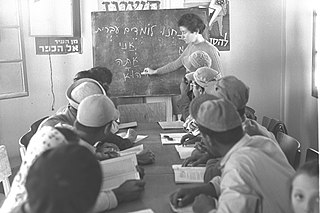
An ulpan, plural ulpanim, is an institute or school for the intensive study of Hebrew. Ulpan is a Hebrew word meaning "studio", "teaching", or "instruction".

Shmuel Noah Eisenstadt was an Israeli sociologist and writer. In 1959 he was appointed to a teaching post in the sociology department of the Hebrew University in Jerusalem. From 1990 until his death in September 2010 he was professor emeritus. He held countless guest professorships, at the University of Chicago, Harvard University, the University of Zurich, the University of Vienna, the University of Bern, Stanford and the University of Heidelberg, among others. Eisenstadt received a number of prizes, including the Balzan prize and the Max-Planck research prize. He was also the 2006 winner of the Holberg International Memorial Prize. He was a member of many academies, including the American Academy of Arts and Sciences and the Advisory Editors Council of the Social Evolution & History Journal. His daughter Irit Meir was a noted scholar of Israeli sign language.
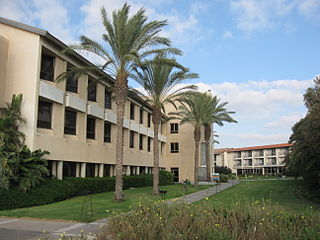
Shefayim is a kibbutz in central Israel located 2.5 miles north of Herzliya along the Mediterranean coast. Shefayim falls under the jurisdiction of Hof HaSharon Regional Council. In 2019 it had a population of 1,302.
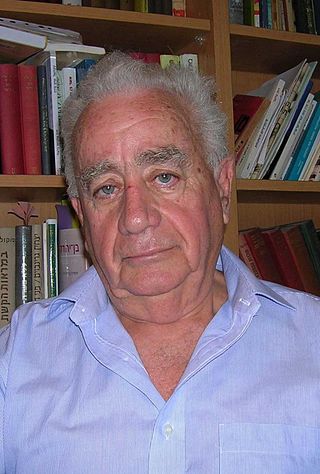
Yosef Gorny, is Professor of Study of Zionism and head of the Zionist Research Institute at the Tel Aviv University. He is a former head of the Weizmann Institute for the Study of Zionism, at the same university.
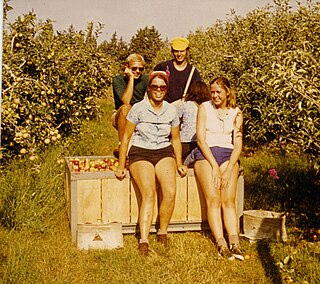
Kibbutz volunteers are people who come from all over the world to live and work in a kibbutz in Israel. These volunteers, mostly young people, usually stay at the kibbutz for a short period of time, working in various branches of the kibbutz economy. Most volunteers typically come to Israel for a short period of two to three months under a volunteer visa and participate. Volunteers receive food and board, and sometimes pocket money. Some volunteers combine work with studying Hebrew at a kibbutz ulpan. Some kibbutzim organize trips and cultural events for the volunteers.

Yitzhak Gruenbaum was a noted leader of the Zionist movement among Polish Jewry in the interwar period and of the Yishuv in Mandatory Palestine. Gruenbaum was the first Interior Minister of the State of Israel.

Bar'am, sometimes spelled as Baram, is a kibbutz in northern Israel. Located approximately 300 meters from Israel's border with Lebanon near the ruins of the ancient Jewish village of Kfar Bar'am. Bar'am National Park is known for the remains of one of Israel's oldest synagogues. The kibbutz falls under the jurisdiction of Upper Galilee Regional Council and had a population of 594 in 2019.

Mishmar HaEmek is a kibbutz in northern Israel. Located in the western Jezreel Valley, it falls under the jurisdiction of the Megiddo Regional Council. Mishmar HaEmek is one of the few kibbutzim that have not undergone privatization and still follow the traditional collectivist and socialist kibbutz model. In 2019, it had a population of 1,271. At least six former members of the Knesset hail from Mishmar HaEmek.

Hanita is a kibbutz in northern Israel. Located in the western Galilee approximately 15 kilometres northeast of Nahariya, it falls under the jurisdiction of Mateh Asher Regional Council. In 2019 it had a population of 756.
An urban kibbutz is a form of kibbutz located within an existing city. There are currently just over 100 in Israel, totalling around 2,000 members.
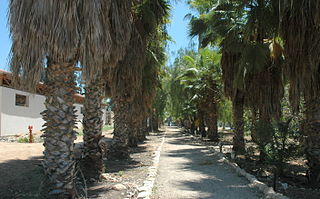
Hulda is a kibbutz in central Israel. Located in the Shephelah near the Hulda Forest and the Burma Road, it falls under the jurisdiction of Gezer Regional Council. In 2019 it had a population of 1,163.

Events in the year 1927 in the British Mandate of Palestine.
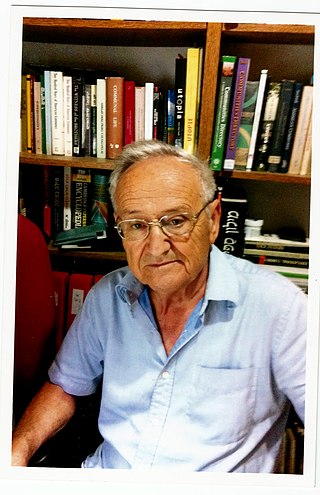
Yaacov Oved is a historian and Professor Emeritus in the Department of History at Tel Aviv University, member of Kibbutz Palmachim, research fellow at Yad Tabenkin: the institute of research and documentation of the kibbutz movement, researcher of the history of communes in the world and co- founder of the International Communal Studies Association.
Belgium is a European country with a Jewish population of approximately 35,000 out of a total population of about 11.4 million. It is among the countries experiencing an increase in both antisemitic attitudes and in physical attacks on Jews.
Esther Ohana was an Israeli woman who was killed by a rock thrown by a Palestinian Arab through the window of the vehicle in which she was riding on 29 January 1983, hitting her directly in the head. Ohana never regained consciousness and died two weeks later in hospital.

















